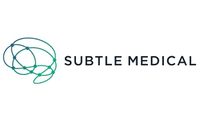

- Home
- Companies
- Subtle Medical, Inc.
- Software
- SubtleGAD - AI-powered Software for ...
SubtleGAD - AI-powered Software for Safer MRI
At Subtle Medical, we’re dedicated to developing innovative healthcare solutions that put patient safety and wellbeing first. SubtleGAD™ (currently in the investigational stage) is a software that uses state-of-the-art deep learning technology to enable a 90% dose reduction of GBCAs (Gadolinium based contrast agents) for contrast-enhanced MRI exams while maintaining excellent image quality. There are more than 30 million contrast-enhanced MRI exams performed each year. When lower gadolinium dosage is administered for any reason, SubtleGAD software can improve image quality, diagnostic accuracy and lesion detectability. The software is compatible with any brand of MRI scanner and PACS and seamlessly integrates into the current workflow.
Award-Winning Research
Subtle’s newly patented technology was initially invented in 2017 and published in 2018 by researchers from Stanford University demonstrating feasibility. It was highlighted by RSNA as one of the key advances of the year and won an RSNA research prize. Subtle received a $1.6 million SBIR NIH Grant in 2019 to pursue research of SubtleGAD™, and in 2020, Phase II funding was awarded based on the results achieved during Phase I, as well as the scientific and technical merit of the project.
A generic deep learning model for reduced gadolinium dose in contrast-enhanced brain MRI
A recent study published in Magnetic Resonance in Medicine (MRM) highlighted recent progress on the technical improvements that have been made by the company since the initial work at Stanford.
Deep learning-based methods may minimize GBCA dosage in brain MRI
A recent study by radiologists at Tiantan Hospital was published in European Radiology demonstrating improved image quality and excellent lesion detectability with a blind reader study.
Deep learning enables reduced gadolinium dose for contrast-enhanced brain MRI
Initial research published in Journal of Magnetic Resonance Imaging (JMRI) demonstrating the feasibility of reducing 10x dosage while maintaining excellent image quality and diagnostic information.
Toward a site and scanner-generic deep learning model for reduced gadolinium dose in contrast-enhanced brain MRI
Presented at ISMRM demonstrating improved design of SubtleGAD for better generalizability towards various scanner models and imaging protocols.
Evaluation of Deep-Learning-Based Technology for Reducing Gadolinium Dosage in Contrast-Enhanced MRI Exams
Extensive reader study and winner of the RSNA Research Prize showing AI can reduce the dosage of MR contrast agents that may be deposited into the body and brain.
Better Patient Care
The ability to reduce gadolinium dosage by 90% when combined with SubtleGAD™ software addresses real and perceived safety and liability concerns for patients and imaging institutions around the long term effects of GBCAs used in contrast-enhanced MRI procedures.
Lowering contrast dosage has the potential to benefit tens of millions of patients, including pediatric and neonatal patients, as well as patients with chronic neurological diseases such as multiple sclerosis (MS) who have frequent contrast-enhanced MRI exams. Other potential applications include breast MRI studies, used for screening and diagnostic studies in patients with dense breasts, patients with advanced chronic kidney disease (CKD) or marginal kidney function issues who cannot currently undergo full-dose contrast-enhanced MRI, and other patients with concerns about gadolinium retention in the body.
